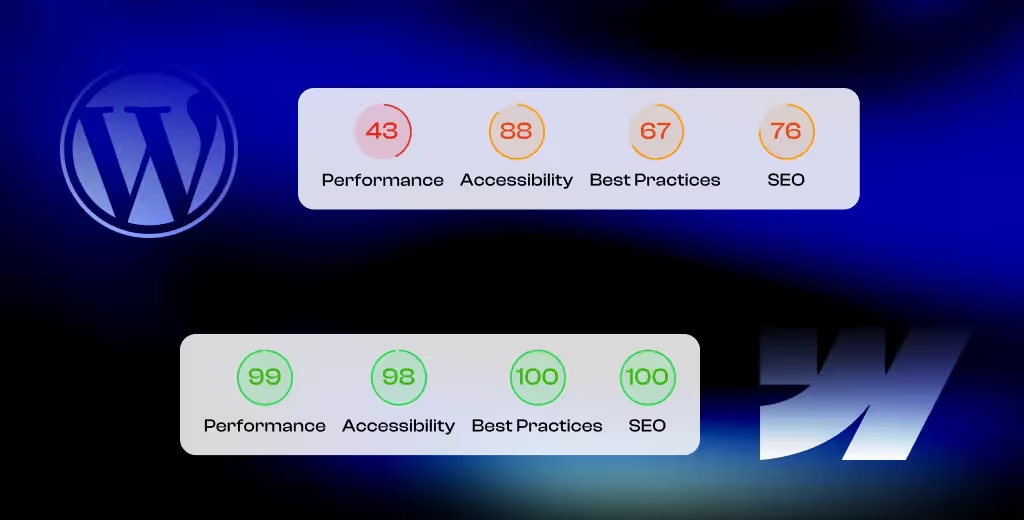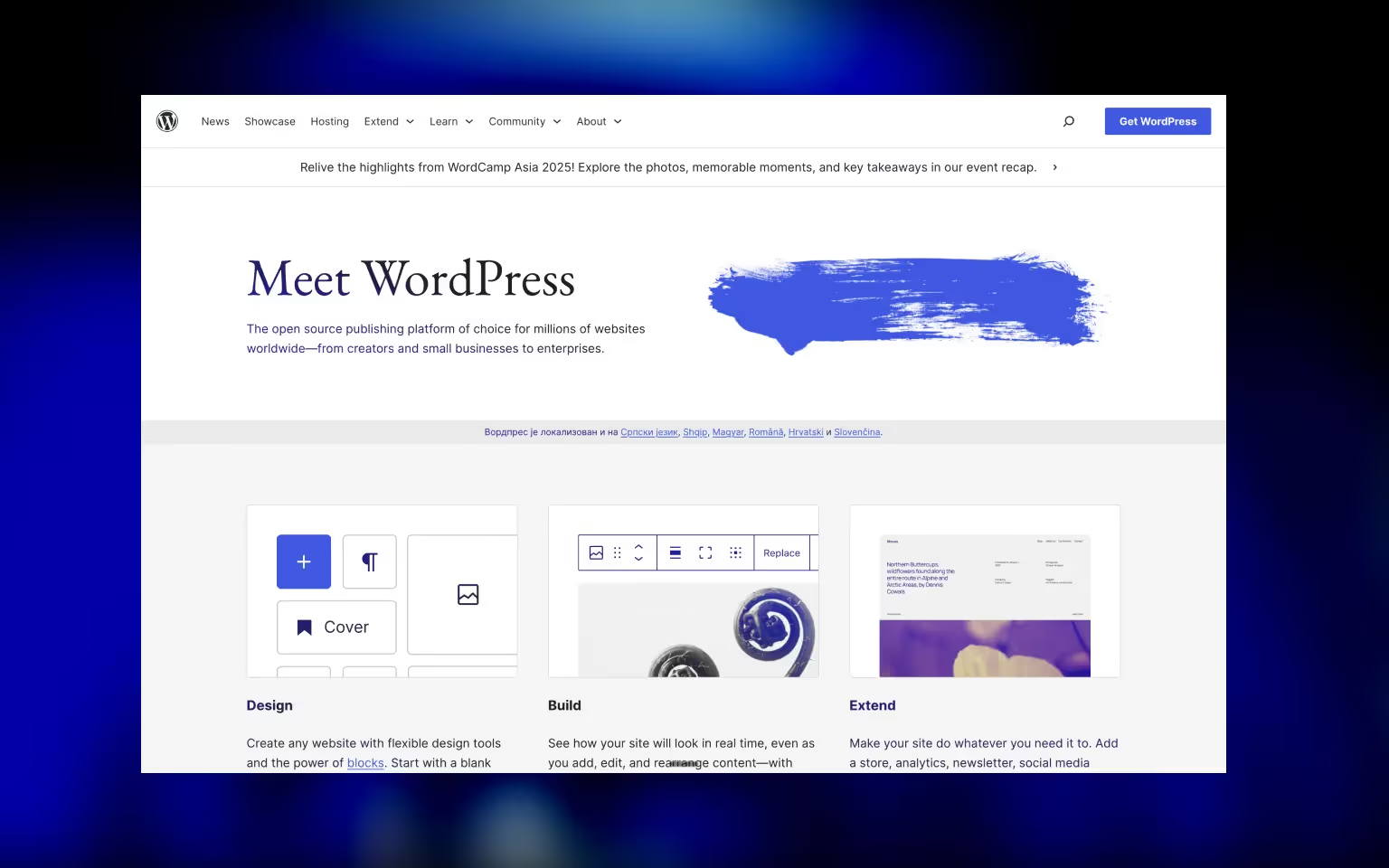Your CMS shapes how effectively you can implement SEO best practices. From technical factors like crawlability and speed to practical elements such as managing redirects and metadata, the platform you choose has long-term impact on search performance.
This article compares the leading CMS platforms for SEO, explains their strengths and trade-offs, and outlines the key features you should expect from a platform in 2026.
Why CMS Choice Matters for SEO
Your CMS defines the technical foundation of your website. A well-structured CMS makes it easier for search engines to crawl and index your pages, while a poorly optimized one can slow down performance and block ranking potential.
Key areas influenced by CMS choice include:
- Crawlability and Site Structure: Clean, logical HTML and URL structures help search engines understand your site hierarchy.
- Performance: Page speed is a ranking factor. A CMS that outputs lean code and serves content through a strong hosting environment has a clear advantage.
- Metadata Management: Your CMS should allow easy editing of title tags, meta descriptions, alt text, and canonical tags.
- Redirects and Sitemaps: Good platforms provide simple ways to handle redirects and generate XML sitemaps.
- Scalability: As your site grows, your CMS should support more content without becoming unwieldy.
In short, the CMS you select is not a direct ranking factor, but it can significantly impact how well you can implement SEO best practices.
For businesses that need expert guidance to implement these practices effectively, working with an SEO agency for tech startups ensures the chosen CMS is leveraged to its full potential. Additionally, pairing a solid CMS with up-to-date strategies like Answer Engine Optimization (AEO) will boost your chances of capturing traffic via direct answers in search and voice results.

Criteria for Choosing the Right CMS for SEO
No single CMS is perfect for every use case. The right choice depends on your goals, resources, and growth plans.
Consider the following when making a decision:
- Team skills: If you have developers, Drupal or headless CMS solutions may be an option. If you rely on marketers, Webflow or WordPress provide easier workflows.
- Content type: For ecommerce, Shopify is the natural choice. For content-heavy blogs, WordPress offers the most flexibility. For design-driven marketing sites, Webflow is a top contender.
- Scalability: Your CMS should be able to support your future needs without major technical debt.
- Maintenance: Open-source solutions may require more upkeep compared to hosted platforms.
The best CMS for SEO is the one that allows you to implement best practices consistently while fitting into your overall business and marketing operations.
Key SEO Features of a CMS
When evaluating CMS platforms, certain features should be non-negotiable. These features directly affect how well your site can perform in search results.
Customizable Metadata
Your CMS should let you easily edit page titles, meta descriptions, alt text, and canonical tags. Without this control, it is almost impossible to optimize your pages effectively.
Built-in SEO Tools or Extensions
Native SEO settings or access to high-quality plugins make optimization easier. WordPress, for example, has plugins like Yoast or Rank Math, while Webflow provides SEO settings directly in its Designer.
Mobile Responsiveness
Since Google indexes mobile-first, the CMS should produce responsive pages or offer templates optimized for different devices.
Performance and Hosting
Fast, reliable hosting and clean code are critical. Platforms that manage caching, CDNs, and image optimization automatically remove much of the heavy lifting.
Redirects and Sitemap Management
Managing 301 redirects and auto-generating XML sitemaps should be simple. These features ensure smooth migrations and consistent crawling.
Scalability and Flexibility
A CMS should scale as your content grows. It should support advanced structures like categories, tags, and collections without compromising performance.
Top SEO-Friendly CMS Platforms
Not every CMS is built with SEO in mind. Below is a comparison of the most common platforms and how they measure up when it comes to search performance.
Webflow: The Best CMS for SEO
Webflow is a visual-first CMS that produces clean, semantic HTML and CSS without excess bloat. Based on Binary Works, Webflow’s usage has been steadily climbing, rising from 0.9% to 1.2% CMS market share between 2022 and 2025, reflecting around a 10% compound annual growth rate.
From an SEO perspective, it provides direct control over essential elements:
- Edit meta titles, descriptions, alt tags, and canonical tags within the Designer
- Generate sitemaps and manage robots.txt automatically
- Built-in 301 redirect management for content changes or migrations
- Fast hosting on AWS and global CDN support, ensuring excellent performance
Webflow CMS is particularly strong for marketing teams who want design flexibility without sacrificing technical SEO. Its balance of speed, usability, and built-in optimization tools makes it one of the best CMS choices for SEO in 2026.

WordPress: The Most used CMS
WordPress is the most widely used CMS, powering nearly half of the web. According to W3Techs, WordPress powers about 43.4% of all websites—and holds over 60% market share among CMS-powered sites, while platforms like Webflow are growing but still under 1% share.
The tool’s popularity comes from its flexibility, ease of use, and vast plugin ecosystem.
SEO strengths:
- Complete control over metadata through plugins like Yoast SEO and Rank Math
- Thousands of SEO-focused plugins for schema, redirection, internal linking, and performance
- Large library of responsive themes that meet mobile-first requirements
- Strong community support and documentation for SEO best practices
SEO drawbacks:
- Can become slow and bloated if overloaded with plugins or poorly coded themes
- Requires regular maintenance and updates for performance and security
- Hosting quality varies widely and directly impacts site speed
Summary:
WordPress offers unmatched SEO flexibility through its plugin ecosystem and community resources. However, it requires careful optimization and management to deliver top performance.

Drupal: CMS for Enterprises
Drupal is a developer-focused CMS known for its flexibility and scalability. It is often used by large organizations that require complex content structures and multilingual capabilities.
SEO strengths:
- Highly customizable with modules like Metatag and Real-Time SEO providing detailed control over metadata
- Strong security and stability for enterprise-level websites
- Excellent for handling multilingual sites and large content libraries
- Supports advanced technical SEO configurations when set up by developers
SEO drawbacks:
- Steep learning curve for non-technical users
- Many SEO features require additional modules and developer setup
- Less user-friendly compared to platforms like Webflow or WordPress
Summary:
Drupal is ideal for large, complex websites where advanced SEO configurations and security are a priority. It is not the best option for small teams without development resources.

Shopify: Best CMS for Ecommerce
Shopify is a leading ecommerce CMS designed to make setting up and managing an online store simple. It comes with essential SEO features built in, making it a popular choice for retailers.
SEO strengths:
- Customizable URLs, title tags, and meta descriptions for products and pages
- Automatic sitemap generation and built-in robots.txt management
- Secure, fast hosting and CDN support out of the box
- Large app store with SEO and marketing integrations
SEO drawbacks:
- Fixed URL structure for certain page types, such as /collections/ in category URLs
- Blogging capabilities are limited compared to dedicated content platforms
- Advanced SEO customization often requires third-party apps
Summary:
Shopify is a strong choice for ecommerce businesses prioritizing product visibility and fast site performance. However, its rigid URL structure and limited blogging features may restrict more content-heavy SEO strategies.

Wix: Beginner-friendly CMS
Wix is a beginner-friendly CMS and site builder, popular with small businesses and individuals who want to get online quickly.
SEO strengths:
- Built-in SEO Wiz tool that guides users step by step through optimization
- Easy customization of page titles, meta descriptions, and URL slugs
- Automatic redirects and sitemap creation for improved crawlability
- Responsive templates suitable for mobile-first indexing
SEO drawbacks:
- Limited flexibility for advanced SEO configurations
- Less control over code output compared to open-source platforms
- May experience performance issues on content-heavy or complex sites
Summary:
Wix is best suited for beginners who need a simple, guided approach to SEO. While it provides all the basics, it is not the strongest option for scaling complex SEO strategies.

Squarespace: CMS for Creatives
Squarespace is a design-focused CMS favored by creatives, portfolios, and small businesses that prioritize aesthetics.
SEO strengths:
- Straightforward SEO settings for titles, descriptions, and indexing controls
- Automatic sitemap generation and mobile-responsive templates
- SSL certificates included by default for security and trust signals
SEO drawbacks:
- Limited customization options for advanced SEO needs
- Lacks a plugin ecosystem to extend SEO functionality
- Restricted control over schema markup and technical configurations
Summary:
Squarespace is a good option for small sites that need attractive design and basic SEO features. However, it lacks the flexibility and depth required for more advanced optimization.

Joomla: Flexible CMS
Joomla is an open-source CMS that offers more flexibility than simple site builders while being less complex than Drupal.
SEO strengths:
- Supports SEO-friendly URLs and metadata out of the box
- Large extension directory, including SEO-specific add-ons
- Good multilingual support compared to some alternatives
- Customizable structure for different types of content
SEO drawbacks:
- Admin interface can be confusing for beginners
- Requires manual setup for many SEO features
- Smaller community and fewer plugins compared to WordPress
Summary:
Joomla is a middle-ground CMS that provides solid SEO functionality when configured correctly. It is best suited for users who want more flexibility than Wix or Squarespace but do not need the complexity of Drupal.

CMS SEO Feature Comparison Table
Now that we’ve looked at each CMS in detail, it helps to see how they compare side by side. The table below summarizes the core SEO features of each platform, making it easier to evaluate which aligns with your needs.
Many businesses choose Webflow for its balance of speed and control, but successful outcomes often come down to the build itself. That’s why working with a specialized Webflow development agency can ensure your site is both beautifully designed and fully optimized for search.
FAQ on Best CMS for SEO
Which CMS is best for SEO?
Webflow is one of the best CMS options for SEO in 2026. It combines fast hosting, clean code, and built-in optimization tools without requiring third-party plugins. WordPress remains a strong contender for flexibility, while Shopify is best for ecommerce and Drupal for enterprise use cases.
What SEO features should a CMS have?
A CMS should allow customization of titles, meta descriptions, alt text, and URLs. It should provide fast hosting, mobile responsiveness, redirect management, and sitemap generation. These features create the technical foundation needed for effective SEO.
Does using WordPress or Webflow automatically improve SEO?
No CMS automatically improves SEO. Search rankings depend on content quality, backlinks, and optimization practices. A CMS simply makes it easier or harder to apply those best practices.
How do I handle SEO when migrating to a new CMS?
Use 301 redirects to map old URLs to new ones, preserve meta data where possible, and update your sitemap. Test the new site in Google Search Console to identify crawl errors and confirm indexing.
Is CMS choice a ranking factor for Google?
No, Google does not rank sites higher based on the CMS used. The platform is not a ranking factor. What matters is how the CMS helps you implement SEO fundamentals consistently. To learn more, read Google's ranking systems guide.





